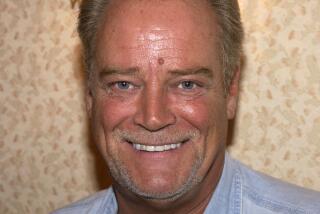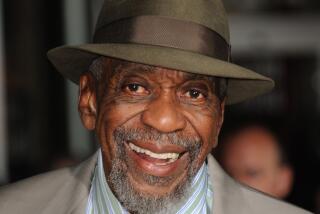Joe Cobb, 85; Was in ‘Our Gang’
- Share via
Joe Cobb, the “fat kid” in the silent “Our Gang” comedies produced at Hal Roach Studios during the 1920s, has died. He was 85.
Cobb died of natural causes Tuesday at a convalescent hospital in Santa Ana, where he had moved about four years ago from his longtime home in Culver City.
The chubby Cobb was one of the most enduring and memorable figures of the early gang of kids assembled by producer Hal Roach at his Culver City studios.
Beginning with “The Big Show” in 1923 when he was 5, Cobb appeared in 86 “Our Gang” comedies over a seven-year period. That included the series’ last silent film, “Saturday’s Lesson,” and its first all-talking short, “Small Talk,” in 1929.
“Joe Cobb was an enthusiastic kid and a kid that the other members of the Gang respected: cheerful, optimistic but reliable, dependable,” said film historian Richard Bann, who first interviewed Cobb for “Our Gang: The Life and Times of the Little Rascals,” a 1977 book he co-wrote with Leonard Maltin.
“Cobb,” Bann said, “always seemed to make you smile when you saw him.”
Born in Shawnee, Okla., in 1917, Cobb arrived in Los Angeles on vacation with his father in September 1922.
“He thought we’d make the rounds of the studios, and, of course, we eventually stopped at Hal Roach’s,” Cobb told Bann. “We drove into the parking lot just as the noon whistle blew, and so the casting people took us right out to lunch with them.”
That same afternoon, Cobb recalled, he was taken to the wardrobe department and he immediately began working on a picture called “A Tough Winter,” with Snub Pollard, Marie Mosquini and Jimmie Finlayson. Cobb played Mosquini’s little brother.
After Cobb completed the comedy, the film’s director, Charles Parrott (who also was the supervising director for “Our Gang”), installed Cobb in the Gang.
Cobb became one of Roach’s favorite “Our Gang” members.
“I think that Hal Roach looked for particular types of kids so that as a kid in a theater looking at those films or even as an adult looking at those films you could identify with somebody in that group,” said Bann.
“There was always a little girl, a tough kid, a fat kid, the smart kid, and especially in the silent films, many minorities were represented. Roach wanted real kids doing real things. He didn’t want actors. He wanted the genuine American boyhood and girlhood cross-section of kids.”
As happens with child actors, Cobb left the series because he got too old.
After leaving, the studio re-engaged him in 1936 to serve as master of ceremonies for “Our Gang” publicity tours, and he made return appearances in three “Our Gang” films.
Cobb played minor roles in films such as “Tuxedo Junction” for Republic and “Where Did You Get That Girl?” for Universal before doing defense work as an assembler during World War II.
He retired from North American Aviation, a division of Rockwell International, in 1981.
In his later years, Cobb made occasional appearances at meetings and conventions of the Sons of the Desert, the Laurel and Hardy appreciation society.
“He had the same wonderful personality,” said Bob Satterfield, head of the organization’s Way Out West chapter in Los Angeles. “You fell in love with him the minute you met him.”
Bann said the adult Cobb, who never grew much taller than about 5 feet and remained stout, was a true gentleman.
“When you met him, he was the most well-mannered, kind, well-dressed gentleman, and most everyone liked him because of those qualities,” he said.
Cobb is survived by a sister, Lucile Frank of Dallas; and a nephew, William Engstrom of Santa Ana.
Services will be private.
More to Read
Only good movies
Get the Indie Focus newsletter, Mark Olsen's weekly guide to the world of cinema.
You may occasionally receive promotional content from the Los Angeles Times.










